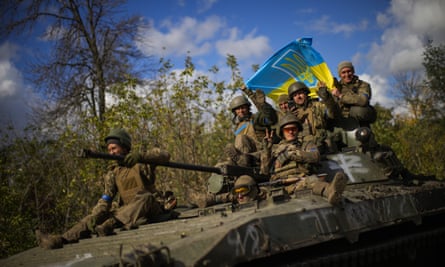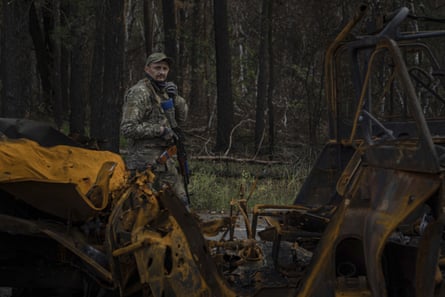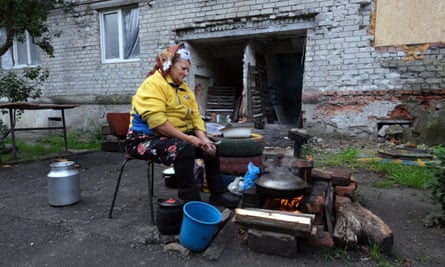Yon the shattered streets of Lyman, a Ukrainian city that has lived through the Russian invasion, months of occupation and last week’s brutal battle to liberate it, evidence of the chaotic and bloody Russian withdrawal and defeat is everywhere.
Emerging from the dugout of a former Russian checkpoint on the outskirts of the Donbas city, a Ukrainian soldier appears clasping a Russian copy of Tolstoy’s War and Peace, which he places next to a discarded water bottle cut in half and filled with rifle ammunition. He points inside to an Orthodox icon left pinned to a wall.
The fate of the former occupants of the dugout is unknown: whether they are now, or prisoners were killed in the fighting. Or whether they died during the subsequent pursuit towards neighboring Kreminna, where a fleeing Russian convoy was shelled relentlessly by Ukrainian forces.
Or perhaps they managed to escape to be chased still further as the Ukrainian counteroffensive continues to push the Russian forces back.
It was not only equipment and personal belongings that were abandoned here. The Russians also left behind their dead to be worried by Lyman’s dogs, bodies that have been gathered by Ukrainian mortuary teams over the past three days.
But it is along the narrow roads outside Lyman where the fighting appears to have been the most intense.
The tarmac is holed and littered with shrapnel and missile casings, burned-out Russian armored vehicles sit not far from blasted trenches and dugouts. Recently defused anti-tank mines are still visible in some places.

Here, the trees have been splintered and broken like matchwood by rockets and artillery.
Politicians, analysts, and the soldiers who fought in this battle emphasize the importance of Lyman and its railway sidings as the “northern gate” to Luhansk province. But the real meaning is the psychological hit to the morale of Russian troops whose lines have suffered mounting collapses in the east and south.
With Russian forces being pushed ever further back in the sector around Lyman, Ukraine’s military appears to have set its eyes on its next objectives: Lysychansk and Sievierodonetsk, and the heavily contested Donbas city of Bakhmut where the Russians are still trying to advance.
And crucially the fall of Lyman has also given Ukrainian forces a foothold on the north side of the Siverskyi Donets River.
Occupied until last week by soldiers of the Russian 20th Combined Arms army and Bars-13 troops from the Russian Guard – some of whom had earlier retreated from Kharkiv province – when the attack came they were quickly trapped in a rapidly closing encirclement as the villages outside the city, set among rolling hills, were rapidly rolled up.
What is clear is that Ukraine’s military has found a way of fighting that is far more deft and flexible than the Russians – who are heavily reliant on their creaking supply lines – deploying quickly to cut off, encircle and destroy units piece by piece.
And those Russians who stayed to fight were obliterated by shells and missile fire. Or shot in the forests.
At a junction of a level crossing and a road, the trees around a Russian trench have been swept down as if by a giant hand, the road littered with artillery casings, bits of uniform and human remains.
Surveying the scene, “Flagman”, a Ukrainian officer who has fought in this sector since Russia launched its invasion in February, said that while the Russians relied on the roads, the Ukrainians ambushed them from these woods.

“When they first came, they were a bigger force with heavier weapons. So we withdrew to better lines.
“But after the Ukrainian successes in Kharkiv and Izium in September, their forces pulled back to here although they did not really organize themselves. Then our commanders saw an opportunity to hit them.
“I trained as an officer in the Soviet era, and some of the Russian officers here had the same training.
“They were professional but it was their senior officers who let them down. We know that they asked to withdraw,” he says, confirming UK intelligence reports, “but those higher up didn’t care about their lives. In the end they were too busy with their illegal annexation and their celebrations.
“I don’t think the order ever came to withdraw. In the end they organized themselves to flee despite invitations to surrender.”
Now in the aftermath of the battle, the only remnant of Russia’s imperial ambitions is the graffiti painted on the walls by the former occupiers, the scrawl of “Russia rules!” next to inscriptions of the towns and regions from where the soldiers came.
For the few residents who stayed through it all, the aftermath has been grim.
Outside the apartment house where she lives on the fifth floor Olena Grigorivna, 69, was cooking spaghetti in a pan on an open fire that her husband was feeding with scavenged wood.

She says she is exhausted and frightened of an approaching winter in a city without gas and with no windows in her home, words that could sum up the collective mood that seems less euphoric than rejected.
Once a place of about 27,000 people – many of whom worked on the railways – only hundreds remain, moving around the ruined streets by bicycle or on foot.
Many, like Olena, are older, unable or unwilling to flee when the war came.
“It was hard under the Russian occupation,” she says. “My pension didn’t come and we were only given food aid once a month. We didn’t see the Russians soldiers much and when we did there was almost no interaction.
During the battle last week, as Ukrainian forces swept the Russians out in a bloody route, Olena hid in her basement, only realizing it had ended when the blue and yellow Ukrainian flag was raised on a nearby building. “That’s when I knew that it was over.”
The fighting, at least.
Walking with two sticks and with her apartment damaged in the fighting, for Olena the war has not yet gone away, with the sound of booms from the new frontlines in the distance, another reminder.
“I want to know,” she asks sadly. “What was it all for?”
In a grocery shop without electricity and half-empty shelves, a few queue for what provisions are available, paying in what money they have – Ukrainian hrvna or roubles imposed by the occupiers.
Outside, a handful of Ukrainian police, freshly returned to the town, patrol the empty streets.
“I came for bread,” says Viktor Serhiiyovych, 75. “But there isn’t any. There used to be a big bakery in the town but it got hit in the fighting. Now it isn’t working.”
Serhiiyovych returned to Lyman not long before last week’s assault after running out of money.
“All we want is a little peace, and a chance to organize our lives and see the town rebuilt. This is only the third day since the Russians left. The fighting was very loud and I hid in my basement. After the fighting started to die down I went to fix my windows, and that’s when I saw the Ukrainian soldiers had come.”
On the road out a military ambulance tries to find its way through a jam on the back roads. As it is waved forward, one of the medics opens a door briefly to check on the casualty inside being jostled through the ruts.
It clears the jam, disappearing into the distance with its siren wailing. Ukraine’s war is far from over.
www.theguardian.com
George is Digismak’s reported cum editor with 13 years of experience in Journalism